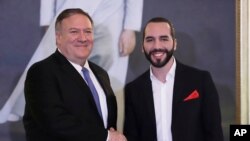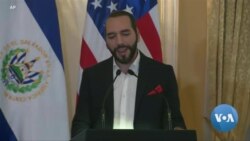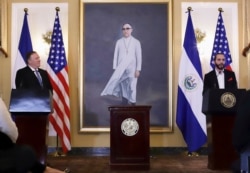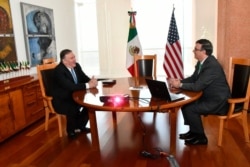El Salvador’s President Nayib Bukele hailed a new chapter in his country’s relationship with the United States, thanking Secretary of State Mike Pompeo for being the first top U.S. diplomat to visit his country in ten years.
For his part, Secretary Pompeo praised Bukele’s shift towards the United States.
“El Salvador with its new leadership has made a clear choice to fight corruption, promote justice and partner with the United States, and together both of our peoples will reap those benefits.”
Pompeo also praised El Salvador for declaring it does not recognize what he termed “the corrupt Maduro regime” as the legitimate government of Venezuela.
El Salvador’s Bukele spoke in English and it was clear that he has a warm rapport with Pompeo.
“We talk about fighting the gangs together, we talk about interdicting narcotics together, we talk about reducing immigration together. So I think this was a very, very important meeting. I think that it’s a game-changer.”
Asked about the U.S. freezing its foreign aid for El Salvador, Honduras and Guatemala to compel their leaders to stem the flow of migration to the U.S. southern border, Bukele had a strong response.
“What do we want to do in El Salvador? Do we want to get more free money? Do we want more blank checks? No. We want to improve the conditions at home.”
Bukele said it “sounds tacky” to have the top U.S. diplomat visiting and to ask him for free money.
Benjamin Gedan of the Wilson Center told VOA Bukele is much more pro-American than his predecessor, and is committed to a new approach to fighting violent gangs and drug traffickers with the U.S.
“The new president [of El Salvador] from the very beginning was very enthusiastic about the idea of working closely with the United States on any number of issues and in fact was skeptical about the role of China in El Salvador which was a source of tension with his predecessor.”
U.S. lawmakers from both major political parties are calling on the Trump administration to restore U.S. foreign aid to El Salvador, Guatemala and Honduras, saying it is counterproductive to punish countries fighting extreme poverty and violence, while at the same time calling on them to reduce the flow of migration.
Before heading to San Salvador, Pompeo met with Mexican Foreign Minister Marcelo Ebrard on an overnight stop in Mexico City. Asked by VOA whether Mexico has done enough to meet the requirements of a 45-day U.S. deadline on imposing potential tariffs, Pompeo said there has been progress, but he would consult with President Donald Trump.
“There are fewer apprehensions taking place today along our southern border, but we’ve got a long way to go yet. There is still much more work to do.”
Mexico has deployed forces to its southern border to stem the flow of migration from Central America. But Benjamin Gedan of the Wilson Center said he is skeptical that Mexico has the resources to sustain this for a long time.
“Rather than addressing the root causes of migration flows from northern Central America, there is this effort to harden the U.S. border, to encourage Mexico to harden its southern border and to have Guatemala, Honduras and El Salvador take their own steps to really impede the flows of individuals north to the United States.”
Before going to Mexico, Pompeo made a stop Saturday in Guayaquil, Ecuador to meet with President Lenin Moreno, the first visit by a U.S. Secretary of State to that country in nine years. They also stressed common goals and improved relations between the two countries. Moreno asked for more help from the U.S. and the international community to deal with the influx of refugees to his country from neighboring Venezuela, calling it a “social apocalypse.” Pompeo discussed the ongoing crisis in Venezuela at every stop.
Pompeo started his jam-packed Latin America trip Friday in Argentina. He confirmed the U.S. has imposed financial sanctions against a Hezbollah militant group leader suspected of directing a deadly bombing in 1994 of a Jewish community center in Buenos Aires that killed 85 people.
“They were killed by members of a terrorist group, Hezbollah, and had help that day from Iran,” which provided “logistical support and funding through its Islamic Revolutionary Guard Corps,” Pompeo said at an event in Buenos Aires to rally support from Latin American leaders in the U.S. fight against Middle East militant groups.
Standing at a memorial at the site of the car bombing, Pompeo lit a candle with AMIA President Ariel Eichbaum and said the worst terrorist attack in Argentina is a stark reminder of the danger to the Western Hemisphere from Hezbollah and other groups based on the other side of the world.
“It was a moving reminder that our discussion today isn’t abstract; it’s not theoretical. The risk of terrorism is real for each and every one of us and each and every one of our citizens.”








